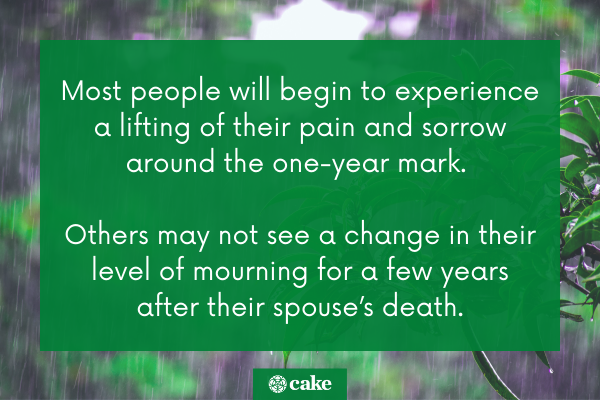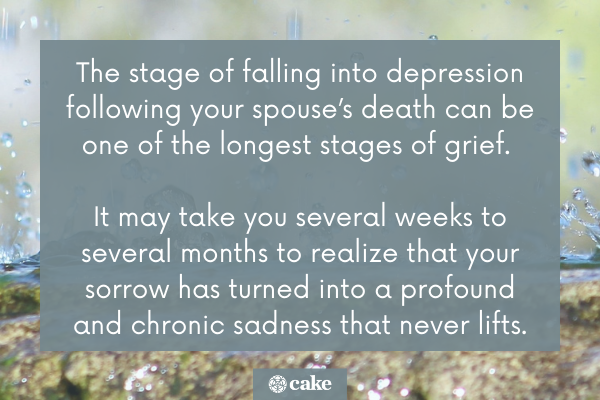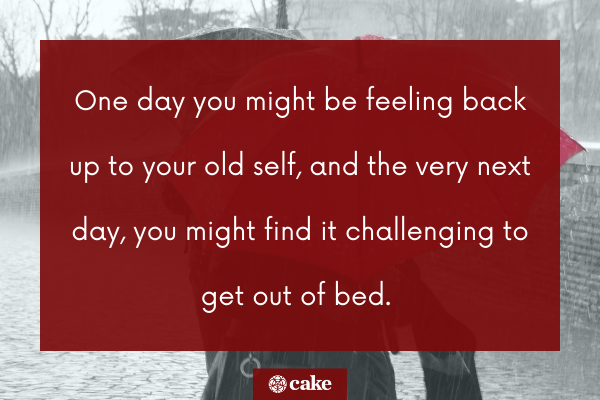How Long Does the Pain Continue After You Loss Someone Really Close to You
After the death of a spouse, you might be asking yourself and others how long does grief last ? You might feel desperate to come out of it, yet ashamed for wanting it to end out of fear that it may seem that you're somehow disloyal to the memory of your loved one.
Jump ahead to these sections:
- How Long Can a Surviving Spouse Expect to Grieve?
- How Long Does Each Stage of Grief Last After Your Spouse Dies?
- Is There Any Way to Speed Up the Grief Process After Your Spouse Dies?
Grief and its effects can last anywhere from a few months to forever and typically somewhere in between. Many contributing factors can determine how you'll fare when it comes to grieving the loss of your spouse.
Some of those things can include the type of relationship you had with them, how close you were, whether they were the center of your universe, or if you led a relatively independent life with outside interests and friendships.
🌻 Express your condolences with a sympathy gift.
Show your support to a grieving friend. Browse our hand-picked selection of gifts.
How Long Can a Surviving Spouse Expect to Grieve?

Many widowed spouses want to know how long does grief last after the death of a spouse, and there isn't any formula to pinpoint when your grief ends. What you can expect is that your emotional well-being will take a toll in the immediate weeks and months following their death as you learn to cope with their absence and all of the other changes taking place as a result of their death.
When you learn of your spouse's death, you may have already been expecting them to die due to a prolonged illness or disease. But sometimes the news can come unexpectedly, and it can be shocking to learn of their death. Either one of these scenarios can contribute to a period of deep sorrow and mourning that can last for several months.
Most people will begin to experience a lifting of their pain and sorrow around the one-year mark. Others may not see a change in their level of mourning for a few years after their spouse's death. You can expect grief to last a few months, and you can expect it to create a roller coaster of emotions where you'll ebb and flow in and out of sorrow and despair.
How Long Does Each Stage of Grief Last After Your Spouse Dies?
The stages of grief for a surviving spouse are similar for all other stages of grief. They can fluctuate from person to person depending on the person's personality and ability to cope with loss, among other things. The five stages of grief are most commonly known as:
1. Denial
After first hearing the news of your spouse's death, one of the first stages of grief that you'll experience is that of shock and disbelief.
This can hold even in cases where you were expecting your spouse's death because of illness or disease. It can take several weeks for you to grasp the fact that your spouse has died. In about six to eight weeks, you will begin to see a shift from shock and denial to the next phase of the grieving process.
2. Anger
Although the stages of grieving tend to be nonlinear and can manifest in any order and at any time, denial usually gives way to anger. You may find yourself angry at the world, the doctors and medical staff, and even at yourself or your spouse for not doing more to prevent their death.
You may start blaming yourself for not keeping your spouse from dying, and you may exhibit anger towards them for having died.
3. Bargaining
Making imaginary deals and bargains on things you know are impossible to do is also part of the grief process. Sometimes it can truly be hard to accept that your loved one has died. You can't accept that their death is real and final. You may find yourself asking a higher power to return your spouse to you, and you'll make promises that in exchange for that, you'll be a better person, spouse, or be more devoted.
No amount of bargaining will bring your spouse back to life. When you're grieving, rational thinking temporarily leaves you, and you strongly believe that if you push and believe hard enough for things to be different, you can get your spouse back.
This type of delusional thinking will eventually make way for the reality of the finality of their death. It may take you several weeks to realize that your spouse is not coming back, but eventually, you'll begin to process that they aren't.
4. Depression

This stage of falling into depression following your spouse's death can be one of the longest stages of grief. It may take you several weeks to several months to realize that your sorrow has turned into a profound and chronic sadness that never lifts. Grief-related sadness will come and go.
One moment you may feel as if you no longer have the will to live without your spouse, and the very next moment, something may come along to cheer you up for a while.
Feeling this way is a normal part of the grief process and is not typically a cause for great concern. When you find that your sorrow is constant and never eases, let someone in your support circle know what's happening so that they can keep an eye on you and monitor your feelings.
There can sometimes be a fine line between sadness and depression that can last for years after your spouse's death.
5. Acceptance
The acceptance stage is usually the final stage of your grief journey. It doesn't mean that once you accept that your spouse has died that your grief ends. You can still feel sad, depressed, and angry even after you've taken things for what they are. This stage lasts for the rest of your life.
Although there is no set timeline for grieving through each of the above stages, you can expect grief to last from several weeks to several years. You may experience some of all of these stages or none of them at all.
Prepare yourself for whatever you experience by knowing and understanding that it's temporary, whatever it is you're feeling. You'll eventually start feeling better even though your grief may linger for years.
Prolonged grief
The standard grieving period can last anywhere from six to twelve months for it to cycle through. This applies to most cases of ordinary grief, with no additional complications coming into play. Things such as your relationship to the deceased, your past experiences, and any unresolved traumas may cause your grief to extend far beyond this initial period.
Don't be alarmed if this happens to you, as many people have some unresolved issues stemming from their past. Learning what's triggering your grief and grief reactions is one of the first ways to know where to begin seeking ways to get through your loss.
Complicated grief
When grief is prolonged and left untreated, it has the potential to turn into complicated grief. What does it mean to suffer from complicated grief? It means that things aren't so cut and dry or simple to work through.
Things that complicate grief can include past physical, emotional, or psychological abuse never healed before the person responsible for it died. Not being able to confront or otherwise gain closure to this type of trauma can complicate how you grieve and how long your grief lasts. There is hope for healing despite the profound sense of sorrow and despair you may be feeling. Talking to a trained grief counselor or therapist will help you recognize some of these issues and help you heal from your pain.
Is There Any Way to Speed Up the Grief Process After Your Spouse Dies?

Grief work is just that. You work through your grief in ways that make sense to your overall recovery. Although you can't technically speed up the process of grieving, you can take affirmative steps to work through your grief to promote healing.
Grief is also cyclical. One day you might be feeling back up to your old self, and the very next day, you might find it challenging to get out of bed. It's vital to your overall psychological, emotional, and physical well-being to allow the grief process to take its course without rushing to get through the grief stages.
To better understand how grief works and how to navigate your way through it successfully, consider reading a few books for surviving spouses written by grief professionals and people just like you who have had similar experiences.
You can learn from what others have gone through and try some of the things they did to get them past their grief. You can expect that some of those things might work for you, while others won't. Don't get discouraged as everyone grieves differently. What works for one person doesn't necessarily mean it's going to work for the next.
There are also many support groups for people who lost a spouse available in person and online. Consider researching those groups that are better suited to your type of loss and explore what they have to offer by attending a few meetings. Most of these groups are noncommittal and will allow you to come in to test the waters for a few sessions. If you find that one isn't right for you, try another until you find one that works.
How Long a Widowed Spouse's Grief Lasts
You can expect your grief to last anywhere from a few months to several years. Many widowed spouses will feel the effect of their loss for the rest of their lives. You may not ever fully get over your loss, but in time, you'll learn to live without their physical presence.
The pain of your suffering will eventually soften, and your grief will tuck itself into a special place deep within your heart and soul.
Source: https://www.joincake.com/blog/how-long-does-grief-last-after-death-of-spouse/
0 Response to "How Long Does the Pain Continue After You Loss Someone Really Close to You"
Post a Comment